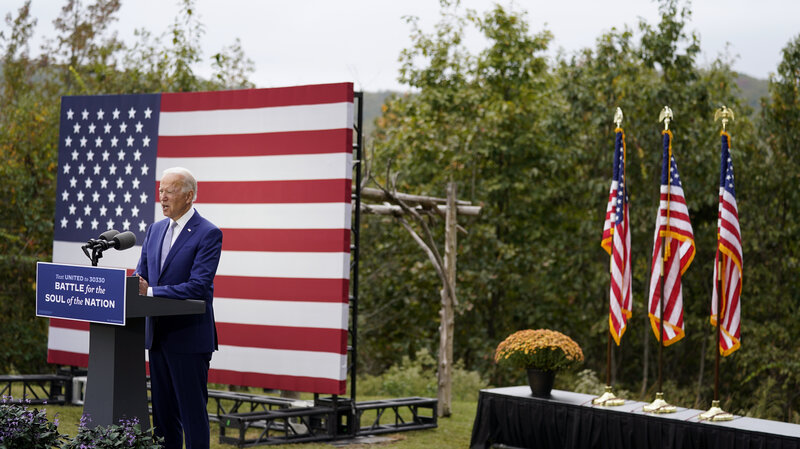Soon after Franklin Roosevelt was inaugurated in 1933, a visitor assessed the stakes of his New Deal proposal. “Mr. President, if your program succeeds, you’ll be the greatest president in American history,” the visitor told him. “If it fails, you will be the worst one.” “If it fails,” Roosevelt responded, “I’ll be the last one.”
That story, from Jonathan Alter’s excellent book “The Defining Moment,” about Roosevelt’s first 100 days, underscores the desperation and uncertainty in the Great Depression as Roosevelt took office — a desperation that may seem familiar today.
This is not the Great Depression today, but we face the worst economic crisis since that time, plus about 4,000 Americans dying daily from the worst pandemic in a century, plus an insurrection incited by the lame-duck president, plus an undercurrent of national delusion that fuels division and violence. Countless numbers believe QAnon nonsense that leading politicians are Satan-worshiping child-traffickers or think coronavirus vaccination is a plot by Bill Gates to plant computer chips in people.
In some ways, F.D.R. had it easy.
That’s the context of President-elect Joe Biden’s “America Rescue Plan,” a far-reaching effort to revive the American economy — and to do much more. Like Roosevelt, Biden is employing a crisis to try to address long-neglected problems in our country. This is Big Policy. You might even call it Rooseveltian.
Of course, what was significant about Roosevelt was the scale not of what he proposed but of what he achieved, and even if Biden’s initial proposal gets through Congress, it does not add up to anything close to the 12-year revolution that was the New Deal. But after years of hesitation and half-steps, it’s thrilling to see truly bold efforts to tackle some of America’s deepest underlying problems.
Coverage of Biden’s $1.9 trillion plan has understandably focused on the $1,400 payments to individuals, the increased unemployment benefits, the assistance to local governments, the support for accelerated vaccine rollout and the investments to get children back in schools. But there is so much more: food assistance, policies to keep families from becoming homeless, child care support, a $15 federal minimum wage and an expansion of the earned-income tax credit to fight poverty.
To me, the single most exciting element of the Biden proposal is one that has garnered little attention: a pathbreaking plan that would drastically cut child poverty.
It is a moral stain on America that almost one-third of people living in poverty are children, a higher share in poverty than any other age group.
In effect, Biden is turning the child credit into something like the child allowances that are used around the world, from Canada to Australia, to reduce child poverty.
The Biden child poverty plan was previously offered as legislation backed by Senators Michael Bennet of Colorado and Sherrod Brown of Ohio, and a Columbia University analysis found that it would reduce child poverty in the United States by 45 percent. For Black children, it would reduce poverty by 52 percent, and for Native American children, 62 percent.
“This is the boldest vision laid out by an American president for fighting poverty, and child poverty in particular, in at least half a century,” said Luke Shaefer, a poverty expert at the University of Michigan.
Americans too often accept poverty or race gaps as hopeless and inevitable. In fact, the evidence suggests they are neither. Two examples:
· As Britain’s prime minister, Tony Blair cut child poverty by half with a strategy that included Biden-style child allowances.
· In Michigan, 41 percent of the early coronavirus deaths were among Black patients, even though Black residents make up only 14 percent of the state population. But Michigan then made a determined effort to address the inequity by bringing testing to Black neighborhoods and ensuring equal access to support programs, and Black residents are now underrepresented in Covid-19 fatalities, according to Dr. Joneigh Khaldun, the state’s chief medical officer.
Perhaps a third example is the New Deal itself. Results of Roosevelt’s boldness included Social Security, rural electrification, jobs programs, networks of hiking trails, the G.I. Bill of Rights and a 35-year burst of inclusive growth that arguably made the United States the richest country in the history of the world.
Yet for the last half-century, we mostly retreated. We overinvested in prisons and tax breaks for billionaires while underinvesting in education, public health and those left behind.
So we think of the United States as No. 1, but America ranks No. 28 worldwide in well-being of citizens, according to the Social Progress Index. And the United States is one of only three countries to have gone backward since the index began in 2011.
Americans are less likely to graduate from high school, more likely to die young, less safe from violence and less able to drink clean water than citizens in many other advanced countries. And then along came Covid-19 and magnified the disparities.

No comments:
Post a Comment